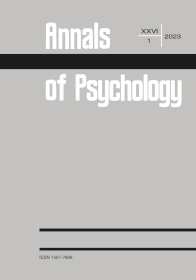PSYCHOMETRIC PROPERTIES OF THE POLISH VERSION
OF THE PARENTAL STRESS SCALE
PSYCHOMETRIC PROPERTIES OF THE POLISH VERSION
OF THE PARENTAL STRESS SCALE
Author(s): Joanna Matuszczak-Świgoń, Lucyna BakieraSubject(s): Cognitive Psychology, Psychology of Self
Published by: Towarzystwo Naukowe KUL & Katolicki Uniwersytet Lubelski Jana Pawła II
Keywords: parents; parental stress; parental satisfaction; Parental Stress Scale;
Summary/Abstract: The article describes the procedure of adaptation and psychometric parameters of the Polish version of the Parental Stress Scale (PSS). The PSS sees parenting as a source of both strength and stress. There- fore, assessing parenting experiences with the PSS enables one to measure both the level of parenting stress and parental satisfaction. The PSS has been shown to be reliable and moderately correlated with standardized measures in expected directions, suggesting its validity (Berry & Jones, 1995). In this research, we investigated parenting stress in a non-clinical, population-based sample of parents and examined the psychometric properties of the Polish version of the PSS. We analysed reliability, as well as factorial and convergent validity. Two online studies were conducted. In Study 1, parents (126 mothers and 124 fathers) were sent a survey link and requested to fill in the PSS, the Perceived Stress Scale, the Parenting Stress Index, the SF-36v2 Health Survey, and the Family Resilience Assessment Scale. Study 2 was conducted to check the PSS structure once again and assess its relia- bility. Parents (111 mothers and 41 fathers) filled out the Polish 16-item version of the PSS (PSS-PL). The PSS-PL demonstrated adequate convergent validity with expected correlations with parenting stress, perceived stress, quality of life, and family resilience. Our results suggest that the PSS-PL is a reliable and valid measurement tool to evaluate the level of parental stress in Polish parents. Impli- cations of the findings and study limitations are discussed.
Journal: Roczniki Psychologiczne
- Issue Year: 26/2023
- Issue No: 1
- Page Range: 23-46
- Page Count: 24
- Language: English

